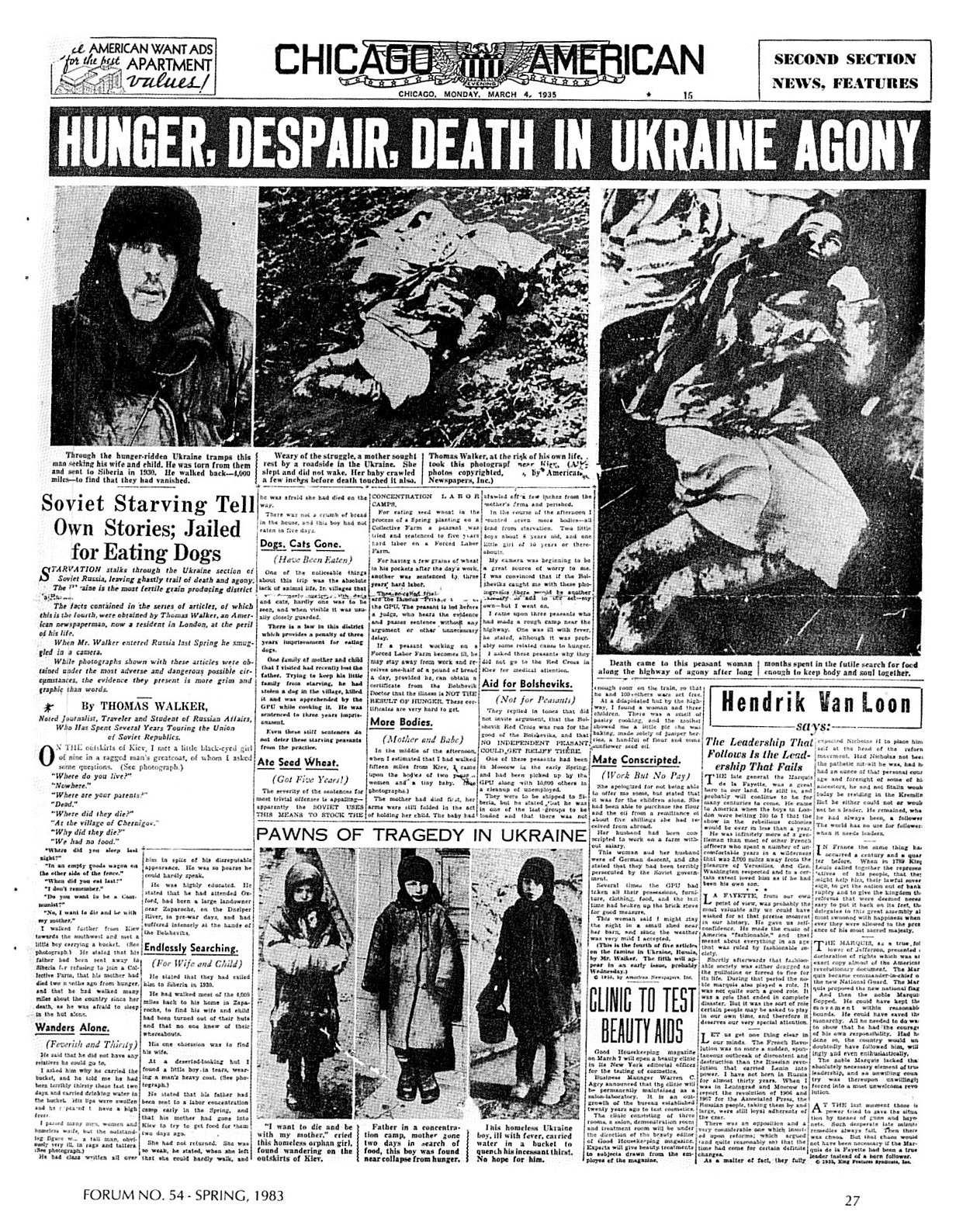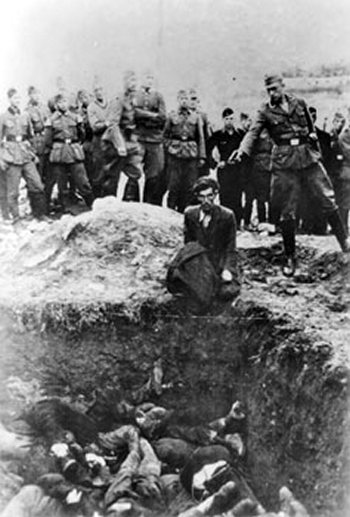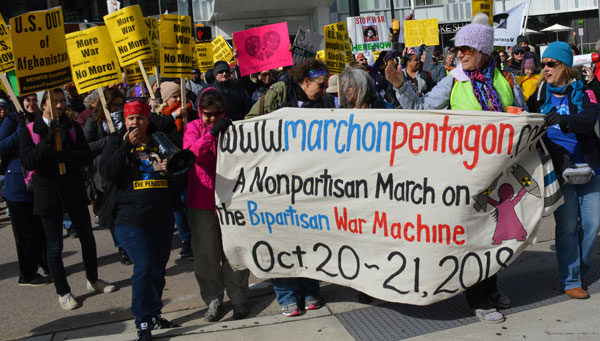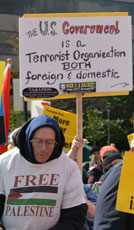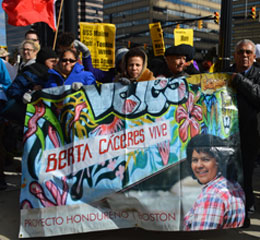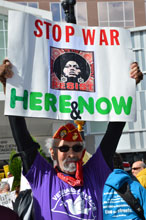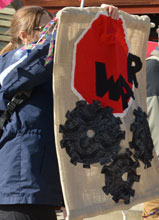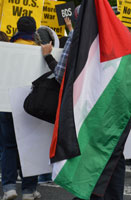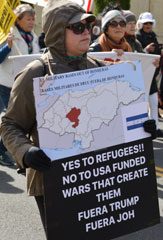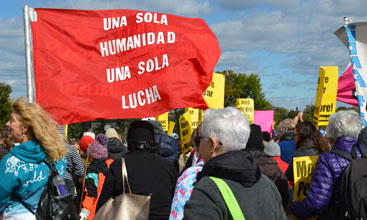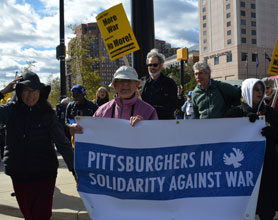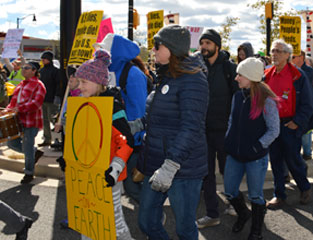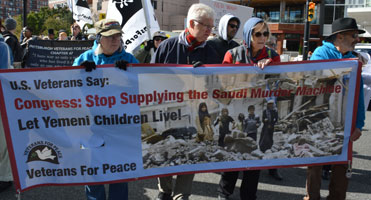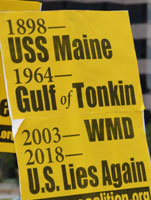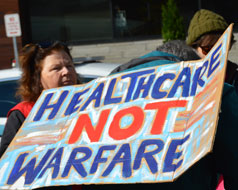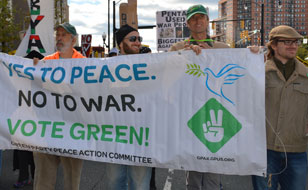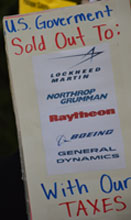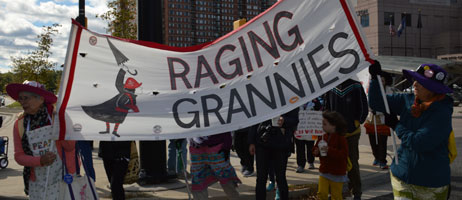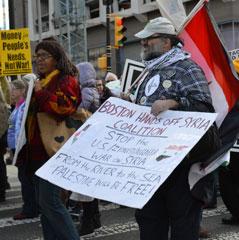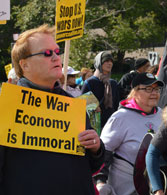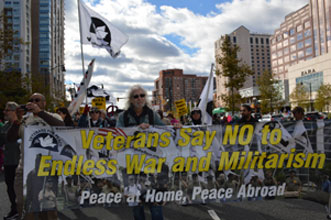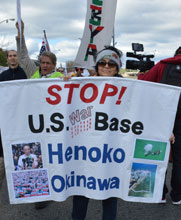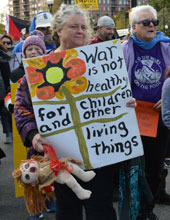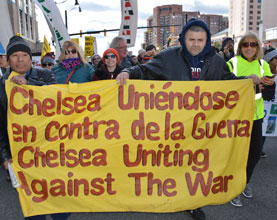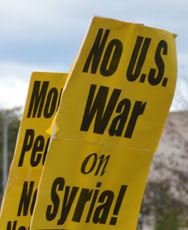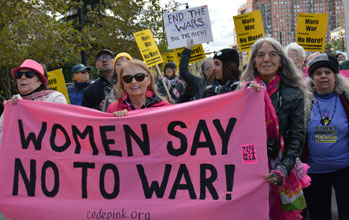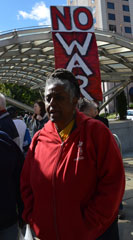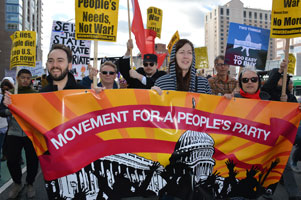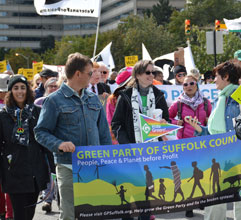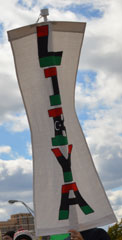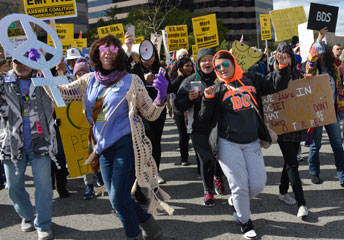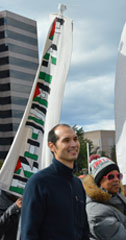
|
November 24, 2018 - No. 41 Matters of Concern
to the Polity |
|
|
One of the striking features of the current referendum in British Columbia on Proportional Representation (PR) has been the support among youth. For example, according to a November 20 poll, 53 per cent of youth between the ages of 18 and 34 are likely to vote for PR while only 22 per cent say they will likely vote for the existing first-past-the-post (FPTP) voting system.
Indeed, many youth, along with planning to vote for PR, have also taken up organizing support for the new voting system on social media, as well as organizing numerous meetings, door-to-door and phone canvasses, leaflet distribution and other activities in communities. In this last week (the deadline for Elections BC to receive ballots is November 30), a special effort is being made by PR youth organizers to reach out to students at colleges and universities around the province, many of whom live away from home and may not have received their mail-in ballots.
To its great discredit, the No side and the monopoly media have engaged in a campaign of disinformation, fearmongering and outright lies with the aim of dissuading youth and other sectors of the population from supporting PR. Indeed, the main activity of the No side has been to utilize the monopoly media which, with very few exceptions, has been a bulwark of backwardness and disinformation. Instead of helping open up a path for youth, they have stood together to block it.
This is in stark contrast to the PR campaign which has featured a huge amount of grass roots organizing and mobilizing, with youth playing a prominent role. This buzz of activity reflects the striving of youth and other sectors of the population for empowerment and their desire to exercise more control over their lives and not be encumbered by antiquated voting structures like FPTP.
There are currently 3,246,647 registered voters in British Columbia. Of these, approximately 800,000 are voters 18 to 34 years of age, which represents a substantial cohort. This demographic has traditionally had the lowest election turn out. However, in the 2017 provincial election, the youth vote jumped to almost 52 per cent from the 45.1 per cent recorded in the previous election in 2013.
 As of November 23, 980,000 mail-in
ballots have been
returned
to Elections BC -- about 30 per cent of registered
voters. This does not include ballots that have been
received by Canada Post (where rotating strikes have been taking
place) but not yet transferred to Elections BC. So, the number is
expected to increase significantly as the deadline nears.
As of November 23, 980,000 mail-in
ballots have been
returned
to Elections BC -- about 30 per cent of registered
voters. This does not include ballots that have been
received by Canada Post (where rotating strikes have been taking
place) but not yet transferred to Elections BC. So, the number is
expected to increase significantly as the deadline nears.
Whatever the final outcome of the PR referendum, younger voters will play a key role, laying the groundwork for further work to empower British Columbians. As Simka Marshall, Vote PR BC Field Director for the "Pro Rep is Lit" youth campaign, explains, "Our generation is not represented at the decision-making table -- and we want in. It's time to make our votes count."
(With files from Research Co. and The Nelson Daily.)
Trudeau Government's Continued Falsification of History
A Continuation of Harper's Campaign to
Support Ukrainian Fascists

Celebration in Toronto, May 6, 2017, of the victory over fascism in
Europe refutes anti-communist lies and recognizes the role of the
Soviet Union in leading the world's people to victory.
Since its election in 2015, the Trudeau government has each November 25 issued an announcement regarding the so-called "man-made" Ukrainian Famine known as the "Holodomor." Every year the announcements repeat the same lies: that it was a systemic genocide committed by the Soviet government, that it killed millions through forced starvation, that it was an attempt to destroy the Ukrainian people, and that it is just one more example of suffering under communism. Also emphasized is that Ukrainians have contributed to Canada and that Canada supports the people of Ukraine and their government.
On November 16, the Legislative Assembly of Alberta held its own annual commemoration of the Holodomor. Then on November 19, a ceremony was held in the Legislature Rotunda to mark Alberta's Ukrainian Famine and Genocide (Holodomor) Memorial Day, which was legislated by the Conservative government in 2008 through Bill 37. The bill proclaimed the fourth Saturday of November each year Alberta's Day of Holodomor Remembrance. Other provinces have passed similar bills and now hold similar annual events.
The Holodomor, said to have taken place in Ukraine in 1932-33, is actually a fictitious "man-made famine." It was a myth concocted by the Hitlerite Nazis to discredit the Soviet Union and the great prestige the Soviet Union had amongst the world's peoples, and to justify aggression against it. The fact is that while there were difficult times in Ukraine, mainly due to the long imperialist invasion of Soviet Russia from 1918-22, which included Canadian troops, no "man-made famine" ever occurred.
The myth of the Holodomor has been deliberately revived and promoted in this period of retreat of revolution to cover up the crimes which the U.S. imperialists are committing in their striving to dominate the world, along with the Israeli Zionists and their backers in Europe and North America, which includes the government of Canada. The Harper government was the first in the world to "officially recognize" the "Holodomor" in 2008 and to falsely declare it to be an act of genocide against the Ukrainian people.
The Trudeau government has never withdrawn Harper's official recognition. The only other parliaments to have legislated "official recognition" of the Holodomor are Argentina, Austria, Estonia, Georgia, Hungary, Lithuania, Poland, Ukraine, and the United States. Estonia, Lithuania and Hungary, along with Ukraine itself, are states which are at the forefront of the neo-Nazi revival in Europe. In Poland's 2015 election, the far-right Law and Justice Party (PiS) won a parliamentary majority. Since taking office they have introduced a raft of laws that restrict human rights, while clamping down on institutions that speak against the party. The current Ukraine government includes a number of declared neo-Nazis. In July, an exhibition inside the Ukrainian parliament, the Rada, glorified the leading Ukrainian Nazi collaborators of World War II.
National Propaganda Tour
The campaign to promote the Holodomor myth has
accelerated
over the years. Almost four years ago, on January 13, 2015,
Stephen Harper announced that his government's Citizenship and
Immigration Department, then run by Alberta's United Conservative Party
leader Jason Kenney, would give the Canada Ukraine Foundation
(CUF) and its allies almost $1.5 million to conduct a "Holodomor
National
Awareness Tour."
 The "Holodomor National Awareness
Tour" is a joint
project of four reactionary organizations: the CUF, the Ukrainian
Canadian Congress (UCC), the Ukrainian Canadian Research and
Documentation Centre (UCRDC) and the Holodomor Research and
Educational Consortium (HREC). One of the directors of CUF is
Andrew Robinson, Ambassador of Canada to Ukraine from 2001 to
2005, the period which included the U.S.-financed Orange
"Revolution."
The "Holodomor National Awareness
Tour" is a joint
project of four reactionary organizations: the CUF, the Ukrainian
Canadian Congress (UCC), the Ukrainian Canadian Research and
Documentation Centre (UCRDC) and the Holodomor Research and
Educational Consortium (HREC). One of the directors of CUF is
Andrew Robinson, Ambassador of Canada to Ukraine from 2001 to
2005, the period which included the U.S.-financed Orange
"Revolution."
On February 22, Arif Virani, Parliamentary Secretary to
the
Minister of Canadian Heritage and Multiculturalism and Member of
Parliament (Parkdale-High Park), announced on behalf of then Minister
Mélanie Joly that the Trudeau
government is providing more than $1.4 million to the
Canada-Ukraine Foundation in support of the 2017-2020 Holodomor
National
Awareness Tour.
A customized forty-foot RV, with an interactive audio-visual technology centre on board, is now touring Canada, visiting schools, universities, government buildings and Ukrainian community and Canadian mainstream events, festivals and gatherings across the country. The campaign, which should be called the "Big Lie Tour" rather than an awareness tour, uses the technique perfected by the Nazis: repeating the lie of the Holodomor over and over again in hope Canadians will rally behind the resurgence of fascist forces in Ukraine and join the war propaganda against Russia.
Fabrication of the Anti-Communist Myth
|
|
It was the Hitlerite Nazis who created the famine myth in 1933 to discredit the Soviet Union, the enemy they most feared. The Nazis wrote front page stories in German newspapers, which were then taken up by the reactionary British press. One enthusiastic promoter of the story was Lord Rothermere, the owner of the London Daily Mail monopoly press. He was anti-Soviet, anti-communist, and anti-labour. A friend of Hitler and Mussolini and sympathetic to Oswald Mosley's British fascist party, Rothermere sent a number of congratulatory telegrams to Hitler before the invasion of Poland. On June 27, 1939, he wrote: "My Dear Fuhrer, I have watched with understanding and interest the progress of your great and superhuman work in regenerating your country."
In September 1934, multi-millionaire William Randolph Hearst, leading U.S. publisher of the "yellow press" and an open supporter of Nazism, met with Hitler and Nazi propaganda minister Joseph Goebbels in Berlin and signed a cash deal to promote a positive image of the Nazis in the U.S. The Hearst papers soon carried columns paid for by Adolf Hitler, Herman Goering and Benito Mussolini, and Hearst attended the huge 1934 Nazi Party Nuremberg rally, featured in Leni Riefenstahl's notorious Nazi propaganda film, Triumph of the Will.
Hearst was virulently anti-Soviet, anti-communist, anti-labour and racist to the core. He hated minorities, particularly Mexicans, whom he portrayed as lazy, degenerate and violent. The Hearst "yellow press" sensationalized, exaggerated and even fabricated news stories, to try to push its reactionary agenda and to sell more newspapers. Egged on by the Hitlerites, Hearst's papers became the biggest propagandists for the Ukrainian famine myth, using fake photographs and printing lies that have been refuted by solid evidence over and over again.
Hearst's fraudulent famine campaign began on February
8, 1935
with a fabricated front-page headline in his Chicago American: "6
million people die of hunger in the Soviet Union." Using material
supplied by Nazi Germany, Hearst began to publish lies about a
genocide which was supposedly deliberately perpetrated by the
Soviet leadership, causing several million to die of starvation
in the Ukraine. What actually took place in the Soviet Union at
the beginning of the 1930s was a major class struggle in which
poor landless peasants rose up against the rich landowners, the
kulaks, and began a struggle for collectivization of
agriculture.


Soviet posters circa 1930. Left: “In our collective farm there is
no room
for priests and kulaks;”
Right: "We will keep out the kulaks."
The Hearst press articles falsely asserting that millions died of a man-made famine in the Ukraine were the origin of the larger myth alleging millions died in the Soviet Union. These myths were taken up by the CIA and Britain's MI5 and, in the post-war period, by the McCarthyite witch hunters, and by paid propagandists such as Stanford Professor Robert Conquest, a former MI5 agent. For decades, such slanders have spread a negative view of socialism in the Soviet Union.
In Canada, former Nazi collaborators and their spawn
have
long led the phony Holodomor campaign. After the Second World
War, Canada became a haven for Ukrainians who had collaborated with
the Nazis and killed their fellow citizens to serve Nazi aims. Once
in Canada, and with the help of the Canadian state, these war
criminals built reactionary domestic organizations (e.g., the Ukrainian
Canadian Congress) which persist to this day. These organizations
displaced
already-established progressive Ukrainian organizations. Some
collaborators achieved high positions, for example, Waffen SS
member Petro Savaryn served as VP of the national PC Party and
was Chancellor of the University of Alberta for four years.

Prime Minister Trudeau, and Foreign Affairs Minister Chrystia Freeland
with Paul Grod (centre), President of the Ukrainian Canadian Congress.
Trudeau Government's Aim in Supporting Ukrainian Fascists
|
|
Just like the Harperites, the Trudeau government is more and more revealing that it openly supports the most reactionary forces. The Holodomor Big Lie Campaign is just one example. Recent revelations exposed Minister of Foreign Affairs Chrystia Freeland's blatant cover-up of her grandfather's role as a Nazi collaborator in wartime Poland and Austria. This, in turn, has led both government ministers and many media pundits to expose themselves as apologists for the Nazi-fascist occupation of Europe during World War II and its collaborators.
In their eagerness to exonerate the foreign affairs minister for lying about her family history and presenting her Nazi-collaborator grandfather Michael Chomiak as a "victim of communism" and Russian aggression, some have gone as far as to justify Chomiak's actions and those of other participants in the genocide of the European Jews and other myriad atrocities as morally acceptable or even as making the best of a bad situation. Others say that from the relative peace today, no judgment can be cast on those who decided, for one reason or another, to aid the fascist enslavement of Europe.
To give more examples, during its burgeoning love affair with the Ukrainian reactionaries, the Trudeau government has never once officially denounced the fact that the Nazis exterminated over three million people in Ukraine. These horrendous crimes have disappeared into thin air. It is as if the Nazis were Canada's war-time ally, not the Soviet Union. In addition, no Canadian government has made official government announcements or created any memorial days or launched any national campaigns to honour those slaughtered by the Nazis in Ukraine and to denounce their murderers.
The Trudeau government has also remained silent about
how the
Canadian state allowed known Nazi war criminals, including those
from the Ukraine, into Canada after the Second World War and then
protected them from prosecution. This includes, for example, the
2,000 members of the Ukrainian-based Galicia Division --
denounced as a criminal organization at the Nuremberg Trials --
who came to Canada after the Second World War, even though they
were members of the Nazi SS and fought for the Nazis against the
Soviet Union and its allies, including Canada.
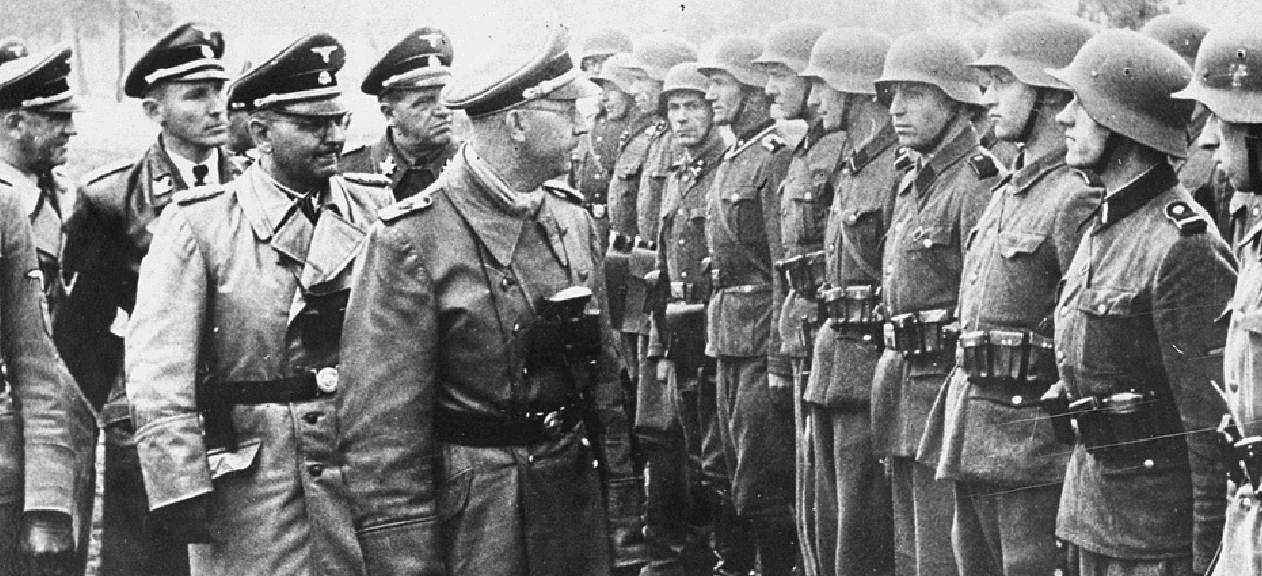
Heinrich Himmler inspecting Waffen-SS Galicia Division, June 3, 1944.
The Trudeau government is also continuing the Harperite
project of funding a private, pro-Nazi, anti-communist monument
to be built in downtown Ottawa, based on one already built in the
U.S. This is totally in keeping with its systematic perpetuation
of Nazi myths, such as the Holodomor. Instead of opposing Nazism,
Trudeau and his ministers have made the Government of Canada an
official supporter of it. The anti-communist monument project, which
was supposed
to be realized through private fundraising by the group Tribute
to Liberty, has virtually no support, and would not have
been able to proceed without the Harper government providing it
with $1.5 million in public funds. Later, Tribute to Liberty also
received funding from extremist anti-communist foreign governments
and sources.[1]
Similarly, attempts to create a buzz with a design contest for the monument created the opposite reaction, with many decrying the proposed designs from an aesthetic and political point of view. Most recently, on November 9, Pablo Rodriguez, Minister of Canadian Heritage and Multiculturalism, was joined by Ludwik Klimkowski, Chair of Tribute to Liberty, in a sod-turning ceremony at the planned site of the monument on the west side of the Garden of Provinces and Territories at the corner of Wellington and Bay Streets in Ottawa. Canadian Heritage reports, "Throughout fall 2018 and winter 2019, the project will move forward by completing plans and securing the permits and approvals required for site remediation, constructing the base for the memorial, and landscaping. In addition, Paul Raff Studio will begin preparations for the construction of the 'Arc of Memory,' the main sculptural piece of the memorial. The memorial is scheduled to be inaugurated in fall 2019."
Finally, while 131 countries voted in favour of the November 21, 2017, anti-Nazi resolution at the United Nations, Canada's UN representative shamefully abstained (in 2014, Canada even voted against the resolution). The U.S. and Ukraine (and Palau) were the only countries to oppose the 2017 resolution. This in itself speaks volumes about the fact that apologetics for the crimes the Nazis carried out before and during the Second World War are an integral part of the defence of liberal democracy by the Trudeau Liberals and all those who declare that any country which does not adhere to the liberal democratic values of a multi-party system, a free-market economy and imperialist conception of human rights is a rogue nation not fit to exist.
All these facts make it clear that the Trudeau
government's
support for the anti-communist, pro-Nazi Holodomor myth and Big Lie
circus now travelling through Canada is no accident. The
Trudeau government's promotion of the Holodomor myth is another attempt
to rewrite history in order to
peddle its self-serving imperialist conception of freedom,
democracy, human rights and government of police powers. The aim of
this, which must be vigorously opposed, is to join the U.S. imperialist
chorus which has declared Russia an enemy and to disorient Canadians so
that they cannot organize themselves to wage an effective defence of
their right to conscience and lay the claims which they must to defend
the rights of all.
Note
1. "Trudeau Government's Support for Foreign Interference in Canadian Politics: Foreign Financing for the Anti-Communist Monument -- A Matter of Great Concern," TML Weekly, November 11, 2017.
Discussion on U.S. Mid-Term Elections
The Pressing Need for People's Empowerment
 There has been a lot of media
coverage
in Canada on the
mid-term elections in the United States. Canadians, along
with people in the U.S., have been inundated with data and
materials focused on the vote -- how various sectors voted, "red"
and "blue" waves, and so forth. All of it is used to divert from
the pro-social and anti-war concerns of the people and,
especially, their struggle for empowerment. This is done in part
through efforts that deny the people form the majority and instead
impose the notion that the role of the people is limited to
voting. Problems like the need for the people to decide who the
candidates will be and set the agenda on matters which relate to war
and
peace, inequality, poverty and the environment, are not to be
examined.
There has been a lot of media
coverage
in Canada on the
mid-term elections in the United States. Canadians, along
with people in the U.S., have been inundated with data and
materials focused on the vote -- how various sectors voted, "red"
and "blue" waves, and so forth. All of it is used to divert from
the pro-social and anti-war concerns of the people and,
especially, their struggle for empowerment. This is done in part
through efforts that deny the people form the majority and instead
impose the notion that the role of the people is limited to
voting. Problems like the need for the people to decide who the
candidates will be and set the agenda on matters which relate to war
and
peace, inequality, poverty and the environment, are not to be
examined.
Diversions are also created using the vote to divide the polity and focus discussion on the divisions rather than on empowerment and how to advance that fight. Further, the fact that the majority do not vote and that candidates are often elected with 25-30 per cent of those that do -- both indicators of the undemocratic nature of the current set-up -- is not to be examined. In this election, an estimated 49 per cent of eligible voters voted, about 116 million people. What about the other 51 per cent? Why is the system designed to ignore the majority of the people?
The problem facing the polity is its lack of political power and how to achieve it. The anachronistic undemocratic institutions, such as the Congress and the electoral process, are designed to exclude and marginalize the majority of the people. Both Democrats and Republicans are pro-war and anti-people. But the promotion of the "blue" Democrat wave is designed to convince people that this is not the case and there is reason to hope the Democrats will bring change. This pressure of the Old is especially significant at this time when working people across the United States are seriously questioning the direction in which the U.S. is headed. The slogans Not My President, Not My Democracy; Not in My Name, Not in My Community; No Crimes Against Humanity in My Community, are ringing forth nationwide. The people are fighting for the affirmation of rights and for relations based on peace and mutual benefit with the peoples of the world.
 All the promotion about "red" and
"blue" waves is designed
to divert from this reality and undermine this consciousness.
Similarly, the emphasis on the fact that more women were elected is
being used to make sure no discussion takes place on what they
stand for. The women elected include: two Native Americans for
districts in New Mexico and Kansas; two Muslim women for
districts in Minnesota and Michigan; a Puerto Rican in the Bronx
in New York City; an African American in Massachusetts -- all
elected to Congress; nineteen African American women elected as
judges in Texas; and a Latina woman elected Governor of New
Mexico, replacing another Latina woman.
All the promotion about "red" and
"blue" waves is designed
to divert from this reality and undermine this consciousness.
Similarly, the emphasis on the fact that more women were elected is
being used to make sure no discussion takes place on what they
stand for. The women elected include: two Native Americans for
districts in New Mexico and Kansas; two Muslim women for
districts in Minnesota and Michigan; a Puerto Rican in the Bronx
in New York City; an African American in Massachusetts -- all
elected to Congress; nineteen African American women elected as
judges in Texas; and a Latina woman elected Governor of New
Mexico, replacing another Latina woman.
No doubt among those elected are women who take stands, like Puerto Rican Alexandria Ocasio-Cortez in the Bronx, who issued a call to Abolish ICE -- U.S. Immigration and Customs Enforcement, and went to the border to confront Customs and Border Protection agents. Rashida Tlaib of Detroit, a Palestinian, draped herself in a Palestinian flag at her victory speech and stood firm in defence of Palestine and the Right of Return during her campaign. She also supports Medicare for all, a $15 minimum wage and abolishing ICE.
Exit Polling Used to Divide the People
Exit polling is commonly used to reinforce the notion that the only role for the people is voting. Thus the main issue to analyze after an election is how various voting "blocs" -- as the media refer to them -- voted. These "blocs" are divided into various categories, such as various minorities, men and women, college educated or not, and combinations of these. This data is increasingly used both to divide and blame particular segments of the population for election results. Supposedly white workers are to blame for Trump's election, while African American and white college-educated women are the reason for gains by Democrats in this election. The role of Latins has also been highlighted.
This very limited polling data is used to make broad generalizations about the population -- college educated white women and white workers vote in a particular way -- and how they vote is supposed to represent their overall stands and concerns as human beings. And, of course, the largest single voting bloc -- those who do not vote -- are not counted at all. Nor are those who vote for parties and candidates other than the Democrats and Republicans, who apparently do not exist!
 The exit polling is done by the
National Election Pool (NEP),
a consortium of monopoly news organizations (CBS, NBC, ABC, CNN,
Fox and AP). It was formed in 2003, replacing the Voter
News Service which failed disastrously in predicting the 2002
election results. The poll surveys only a small sample of voters
across the country and is regularly found to be inaccurate
and unrepresentative (such as in 2004, 2006, 2008, 2012, etc.).
About 50 to 60 per cent of those asked refuse to
participate. This is especially true of the most oppressed
sections of the people and the younger generation. In addition,
absentee voting, early voting, and all-mail elections in a few
states (Oregon, Washington and Colorado) impact the data. In
2016, only 60 per cent of voters reported voting in person on
Election Day, according to the Census Bureau; 21 per cent said
they had cast ballots by mail, and 19 per cent said they had
voted early in person.
The exit polling is done by the
National Election Pool (NEP),
a consortium of monopoly news organizations (CBS, NBC, ABC, CNN,
Fox and AP). It was formed in 2003, replacing the Voter
News Service which failed disastrously in predicting the 2002
election results. The poll surveys only a small sample of voters
across the country and is regularly found to be inaccurate
and unrepresentative (such as in 2004, 2006, 2008, 2012, etc.).
About 50 to 60 per cent of those asked refuse to
participate. This is especially true of the most oppressed
sections of the people and the younger generation. In addition,
absentee voting, early voting, and all-mail elections in a few
states (Oregon, Washington and Colorado) impact the data. In
2016, only 60 per cent of voters reported voting in person on
Election Day, according to the Census Bureau; 21 per cent said
they had cast ballots by mail, and 19 per cent said they had
voted early in person.
Certainly the data reported is not designed to assist the polity to unite and work together to solve the problems the country faces. Far from it, it is used to promote false divisions and false conclusions about what various collectives of the people stand for. Everyone is to accept the perspective of the rulers that a vote represents the individual, or the "blocs" named, when this is not the case. Rather than look at the common stands of the large majority -- which are anti-war and pro-social -- and whether those stands are in any way represented in governance, the people are to accept these false divisions and debate them.
The entire effort ensures that the actual electoral set up, which deprives the people of power, is ignored. So too with polling and its promotion which is a mechanism to disinform the polity. The aim is to undermine the struggle for a modern democracy where the people are able to take the decisions which affect their lives. Despite this, all over the United States, the people are fighting for their rights and the rights of all. The end result of this fight will be the creation of institutions which represent the people and what they stand for.
(With files from Voice of Revolution.)
Opposition to Imperialist War Preparations
Global Campaign to Close All U.S./NATO Bases
Protest organized at Dublin Post Office, November 16, 2018, as part of first International Conference against U.S./NATO Military Bases.
The first International Conference against U.S./NATO Military Bases was held November 16-18 at the Liberty Hall in Dublin, Ireland. The conference was attended by close to 300 participants from over 35 countries around the world. Speakers representing countries from all continents, including Cuba, Argentina, Brazil, Colombia, United States, Italy, Germany, Portugal, Greece, Britain, Ireland, Cyprus, Turkey, Poland, Czech Republic, Israel, Palestine, Kenya, Democratic Republic of the Congo, Japan and Australia, made presentations at the conference.
This conference was the first organized effort by the newly formed Global Campaign Against U.S./NATO Military Bases, created by over 35 peace, justice and environmental organizations and endorsed by over 700 other organizations and activists from around the world. What brought all of us together in this International Conference was our agreement with the principles outlined in the Global Campaign's Unity Statement, which was endorsed by the Conference participants (see below).
The participants in the Conference heard from and
shared with
representatives of organizations and movements struggling for the
abolition of foreign military bases around the world about
the aggressions, interventions, death, destruction, and the
health and environmental damages that the military bases have
been causing for all of humanity, along with the threats and
violation of the sovereignty of the "host" countries.


Opening session of International Conference, November 16, 2018, in
Dublin.
The participants and organizers of the conference agreed as a matter of principle that while they oppose all foreign military bases, they consider the close to 1,000 U.S./NATO military bases established throughout the world, which constitute the main pillars of global imperialist domination by the U.S., NATO and European Union (EU) states, as the main threat to peace and humanity, which must all be closed. The NATO states' military bases are the military expression of imperialist intervention in the lives of sovereign countries on behalf of the dominant, financial, political, and military interests, for the control of energy resources, transport roads, markets and spheres of influence, in clear violation of international law and the United Nations Charter.
The participants in the Conference call upon the organizations and movements who agree on the above to work closely with each other in a coordinated manner as a part of the Global Campaign to organize and mobilize the public around the world against U.S./NATO military bases.
 While we call for the
closure of all U.S./NATO military bases,
we consider the closure of bases and military installations in
certain countries and areas as needing special attention by the
international movement. These, for example, include the U.S.
Guantánamo base in Cuba, the U.S. bases in Okinawa and South
Korea, the U.S. Base in Rammstein/Germany, Serbia, the old and
new U.S./NATO bases in Greece and Cyprus, the establishment of the
new U.S. African Command (AFRICOM) with its affiliated military
bases in Africa, the numerous NATO bases in Italy and
Scandinavia, the Shannon airport in Ireland, which is being used
as a military base by the U.S. and NATO, and the bases newly
established by the United States, France and their allies
on and around Syrian soil.
While we call for the
closure of all U.S./NATO military bases,
we consider the closure of bases and military installations in
certain countries and areas as needing special attention by the
international movement. These, for example, include the U.S.
Guantánamo base in Cuba, the U.S. bases in Okinawa and South
Korea, the U.S. Base in Rammstein/Germany, Serbia, the old and
new U.S./NATO bases in Greece and Cyprus, the establishment of the
new U.S. African Command (AFRICOM) with its affiliated military
bases in Africa, the numerous NATO bases in Italy and
Scandinavia, the Shannon airport in Ireland, which is being used
as a military base by the U.S. and NATO, and the bases newly
established by the United States, France and their allies
on and around Syrian soil.
In order to continue our joint Global Campaign in solidarity with the just causes of the peoples in their struggle against foreign military aggression, occupation and interference in their internal affairs, and the devastating environmental and health impacts of these bases, the participants agreed to recommend and to support coordinated actions and initiatives in the coming year (2019) that shall strengthen the global movement and expand the actions and cooperation as it moves forward. As a step toward this goal, the conference supports the global mass mobilizations against NATO's 70th anniversary Summit in Washington DC, on April 4, 2019 and respective protests in the NATO member states and worldwide.
We declare our solidarity with the Cuban people's decades-long efforts to take back their Guantánamo territory, illegally occupied by the United States, and declare our support for the Sixth International Seminar for Peace and the Abolition of Foreign Military Bases, organized by MOVPAZ for May 4-6, 2019, in Guantánamo, Cuba.
The participants express their most sincere thanks and gratitude to the Peace and Neutrality Alliance (PANA) Ireland, for their generous hospitality and support in hosting this historic Conference.
(Dublin, Ireland, November 18, 2018)
(Photos: E. Davison, A.O. Snodaigh, L. Wirl)
Unity Statement of Global Campaign
We, the undersigned peace, justice and environmental organizations and individuals from around the world, endorse the following Statement of Unity and commit ourselves to working together in a broad-based international campaign to organize an International Conference Against all U.S./NATO Military Bases, with the goal of raising public awareness and organizing non-violent mass resistance throughout the world against all U.S., North Atlantic Treaty Organization (NATO) and European Union (EU) military bases, and their military missions around the world.
While we may have our differences on other issues, we all agree that U.S./NATO military bases are the principal instruments of imperial global domination and primary causes of devastating environmental and health impacts through wars of aggression and occupation, and that the closure of the U.S./NATO military bases is one of the first necessary steps toward a just, peaceful and sustainable world. Our belief in the urgency of this necessary step is based on the following facts:
- While we are opposed to all foreign military bases, we do recognize that the United States maintains the highest number of military bases outside its territory, estimated at almost 1,000 (95 per cent of all foreign military bases in the world). Presently, there are U.S. military bases in every Persian Gulf country except Iran.
- In addition, the United States alone has 19 Naval air carriers (and 15 more planned), each as part of a Carrier Strike Group, composed of roughly 7,500 personnel, and a carrier air wing of 65 to 70 aircraft -- each of which can be considered a floating military base.
 - These bases are centres of
aggressive military actions,
threats of political and economic expansion, sabotage and
espionage, and crimes against local populations. In addition,
these military bases are the largest users of fossil fuel in the
world, heavily contributing to environmental degradation.
- These bases are centres of
aggressive military actions,
threats of political and economic expansion, sabotage and
espionage, and crimes against local populations. In addition,
these military bases are the largest users of fossil fuel in the
world, heavily contributing to environmental degradation.
- The annual cost of these bases to U.S. taxpayers alone is approximately $156 billion. The cost of these military bases drains funds that can be used to fund human needs and enable our countries to provide necessary services for the people.
- NATO, as the armed wing of the United Sates and the European Union, is expanding further to the east to safeguard its control of energy resources and pipelines, spheres of influence and markets for the sake of big capital and the transnational corporations. The European Union, in particular, is advancing alone and/or with NATO to further its militarization with the Permanent Structural Cooperation (PESCO) and its powerful EU army.
- All governments of the member states of NATO bear direct individual responsibility for NATO's aggressive policies, and the increase of their military budgets to two per cent of their Gross Domestic Product (GDP) while their people are suffering under severe austerity measures and the economic crisis caused by their militaristic policies.
- All of this has pushed the world toward ever-increasing militarization, and to ever-deepening antagonism between the U.S. and its NATO allies, on the one hand, and the rest of the world, on the other. Stationed throughout the world, almost 1,000 in number, U.S./NATO military bases are symbols of the ability of the United States to intrude in the lives of sovereign nations and peoples.
 - Many individual national
movements -- for example, in
Okinawa, Italy, Jeju Island Korea, Diego Garcia, Cyprus, Greece,
Serbia, Spain, Ghana, Czech Republic and Germany -- are demanding
closure of the U.S./NATO bases on their territory. The base that
the U.S. has illegally occupied the longest, for over a century,
is Guantánamo Bay, whose existence constitutes a violation of
International Law and the Cuban people's right to sovereignty.
Since 1959 the government and people of Cuba have demanded that
the government of the United States return the Guantánamo
territory to Cuba.
- Many individual national
movements -- for example, in
Okinawa, Italy, Jeju Island Korea, Diego Garcia, Cyprus, Greece,
Serbia, Spain, Ghana, Czech Republic and Germany -- are demanding
closure of the U.S./NATO bases on their territory. The base that
the U.S. has illegally occupied the longest, for over a century,
is Guantánamo Bay, whose existence constitutes a violation of
International Law and the Cuban people's right to sovereignty.
Since 1959 the government and people of Cuba have demanded that
the government of the United States return the Guantánamo
territory to Cuba.
The NATO states' military bases in other countries are NOT in defence of their national, or global security. They are the military expression of imperialist intrusion in the lives of sovereign countries on behalf of the dominant financial, political, and military interests of the ruling elite. Whether invited in or not by domestic interests that have agreed to be junior partners, no country, no peoples, no government, can claim to be able to make decisions totally in the interest of their people, with foreign troops on their soil representing interests antagonistic to those of their peoples.
We express our solidarity with the just causes of the peoples in their struggle against foreign military aggression, occupation and interference in their internal affairs, and their devastating environmental and health impacts, and for a world of real peace and social and environmental justice.
We must all unite to actively oppose the existence of
all
U.S./NATO military bases on foreign soil and call for their
immediate closure. We invite all forces of peace, social and
environmental justice to join us in our renewed global effort to
achieve this shared goal.
(Photos: Nation of Change, H. Otake)
Women's March on the Pentagon
The Women's March on the Pentagon brought together more than 1,000 women from across the U.S. to demand an end to U.S. wars and to defend rights abroad and at home. The two-day event included workshops on Saturday, October 20 and a march on the Pentagon on Sunday, October 21. Workshops were held on organizing independent media and what is necessary for that; songs of resistance -- present and past -- and working together to further develop the cultural front; and on women's self-defence and organizing in communities to defend rights.
The U.S. war against Yemen, using Saudi Arabia as its agent, was also addressed. Discussion brought out that the main reasons for attacking a small country like Yemen are its determined history of resistance, organizing to chart its own path alongside its firm support for Palestine. Dozens of people participated, including some veterans of the 1967 March on the Pentagon.
Also on October 21, a diverse crowd of mainly women,
including
many youth and veterans
and organizations active on various fronts, gathered to march and
rally. The march started from a
nearby metro train stop and continued for more than an hour to the
Pentagon.
The spirit was militant, with chants and songs
demanding Troops Home Now! Not Tomorrow! Participants were
united in their demands to end U.S. wars and to not rely on politicians
of the rich, who sustain a war government and fund a
war economy. The action served to put the issue of war and peace
on the mid-term election agenda, while bringing to the fore the
interest of the
broad majority in standing against the war
machine and developing a democracy where their anti-war stand
is implemented.
Cuba -- A Beacon of Dignity and Justice
Fidel Castro -- People's Hero
This November 25 marks two years since the death of Fidel Castro, the legendary leader of the revolutionary Cuban people, a hero to and collaborator with peoples the world over striving to affirm human rights and dignity. Across Cuba and around the world, activities are being held to commemorate the life of Comrade Fidel.
On this occasion, TML Weekly sends its warmest greetings to the Cuban people and their leadership, with unconditional support for Cuba's defence of its sovereignty and right to be and with full confidence in the striving of the Cuban people to renew their Revolution according to the needs of the times.
The unconquerable spirit that Fidel epitomized lives on today in the Cuban people, who have declared Somos Fidel! (We Are Fidel!). Cuba has weathered the great loss of Fidel amidst increasing hostility from the U.S. The generations born into the Cuban Revolution are defending and carrying forward Cuba's socialist nation-building project. Cuba's dignity and steadfast fulfilment of its social responsibility to the peoples of the region and the world through its outstanding internationalism and as a force for peace and progress are undiminished. Cuba's defence of principle ensures that it cannot be isolated, for example this year where Cuba's just stand once again prevailed in the 27th consecutive vote at the UN against the U.S. blockade. Meanwhile the U.S., and its hegemony and dictate of might makes right, is more isolated than ever.
Fidel's outstanding leadership of the Cuban people has enabled them to collectively realize the all-sided flourishing of the human person and continues to unleash great resourcefulness and creativity for this aim, both at home and abroad. In this way, Fidel, who refused to be memorialized with grand tributes or monuments, will live on in the people's hearts, minds and deeds to realize the new human-centred society.
On February 24, 2008, when Fidel completed his final term as Cuban President, Army General Raúl Castro Ruz noted in his keynote address to close the Constituent Session of the 7th Legislature of the National Assembly of People's Power:
"Fidel is Fidel; we all know it very well. Fidel is irreplaceable and the people shall continue his work when he is no longer physically with us; his ideas will always be with us, the same ideas that have made it possible to build the beacon of dignity and justice our country represents."
¡Hasta la Victoria Siempre,
Comandante!
¡Venceremos!
Declaration from Cuban Public Health Ministry
on Medical Cooperation with Brazil
Jair Bolsonaro, president-elect of Brazil, who has made direct, contemptuous and threatening comments against the presence of our doctors, has declared and reiterated that he will modify the terms and conditions of the More Doctors program, disregarding the Pan-American Health Organization and the agreement reached by that organization with Cuba.
The Ministry of Public Health of the Republic of Cuba, committed to the solidarity and humanist principles that have guided Cuba's medical cooperation for 55 years, has been participating in Brazil's More Doctors program since its inception in August of 2013. This initiative launched by Dilma Rousseff, who was at that time the president of the Federal Republic of Brazil, pursued the noble purpose of guaranteeing medical assistance to the majority of the Brazilian people, following the principle of universal health coverage promoted by the World Health Organization.

Former Brazilian President
Dilma Rousseff marks the second anniversary of the More Doctors
program with Cuban doctors, August 2015.
The program planned the inclusion of Brazilian and foreign doctors who worked in poor and remote areas of the country.
Cuba's participation in this program was arranged through the Pan-American Health Organization with one distinctive feature: it was intended to fill the vacancies left by doctors from Brazil and other foreign nations.
During these five years of work, some 20,000 Cuban collaborators have assisted 113,359,000 patients in more than 3,600 municipalities. They were able to provide health coverage to a vast 60 million Brazilians, when they accounted for 80 per cent of all the doctors who were taking part in the program. More than 700 municipalities were able to have a doctor for the first time ever.
The work of Cuban doctors in areas of extreme poverty, in the favelas of Rio de Janeiro, Sao Paulo, Salvador de Bahia, and the 34 Special Indigenous Districts, particularly in Amazonia, was widely recognized by federal, state, and municipal governments of that country and its population, 95 per cent of which expressed their acceptance, according to a survey carried out by the Federal University of Minas Gerais at the request of the Ministry of Health of Brazil.
On September 27, 2016, the Ministry of Public Health, in an official statement issued close to the expiration date of the agreement and amidst the events associated with the legislative and judicial coup d'état against President Dilma Rousseff, announced that Cuba "would continue to honour its agreement with the Pan-American Health Organization for the implementation of the More Doctors program, provided that the guarantees offered by local authorities were maintained," something that has been so far respected.
President-elect of Brazil Bolsonaro, has questioned the qualification of our doctors and has made their remaining in the program conditional on validating their credentials and has established that contracts will only be signed on an individual basis.

"Less Doctors with Bolsonaro!"
The announced modifications impose conditions that are unacceptable and fail to ensure the guarantees previously agreed upon since the beginning of the program, which were ratified in 2016 with the re-negotiation of the Terms of Cooperation between the Pan-American Health Organization and the Ministry of Health of Brazil and the Cooperation Agreement between the Pan-American Health Organization and the Ministry of Public Health of Cuba. These unacceptable conditions make it impossible to maintain the presence of Cuban professionals in the program.
Consequently, in light of this unfortunate reality, Cuba's Ministry of Public Health has decided to discontinue its participation in the More Doctors program and has so informed the Director of the Pan-American Health Organization and the political leaders of Brazil who founded and defended this initiative.
The decision to bring into question the dignity, professionalism and altruism of Cuban cooperation workers who, with the support of their families, are currently offering their services in 67 countries is unacceptable. During the last 55 years, a total of 600,000 internationalist missions have been accomplished in 164 nations, with the participation of 400,000 health workers who, in quite a few cases, have fulfilled this honorable task more than once. Their feats in the struggle against the Ebola virus in Africa, blindness in Latin America and the Caribbean, and cholera in Haiti as well as the participation of 26 brigades of the Henry Reeve International Contingent of Doctors Specialized in Disaster Situations and Great Epidemics in Pakistan, Indonesia, Mexico, Ecuador, Peru, Chile and Venezuela, among other countries, are worthy of praise.
In the overwhelming majority of the missions that have been accomplished, all expenses have been covered by the Cuban government.
Likewise, 35,613 health professionals from 138 countries have been trained in Cuba at absolutely no cost as an expression of our solidarity and internationalist vocation.
All Cuban cooperation workers have maintained their posts and their full salary in Cuba, together with all due labour and social benefits, just like the rest of the workers in the National Health System.
The experience of the More Doctors program for Brazil and Cuba's participation in it show that it is indeed possible to structure a South-South Cooperation Program under the auspices of the Pan-American Health Organization in order to promote the achievement of its goals in our region. The United Nations Development Program and the World Health Organization have described it as the main example of good practices in triangular cooperation and the implementation of the 2030 Agenda and its Sustainable Development Goals.
The peoples from Our America and from all over the world know that they will always be able to count on the solidarity and humanistic vocation of our professionals.
The Brazilian people, who turned the More Doctors program into a social achievement and, from the very beginning, have trusted Cuban doctors, recognized their virtues and appreciated the respect, sensitivity and professionalism with which they have assisted them, will understand who are to be held responsible for our doctors not being able to continue offering their fraternal contribution in that country.
Havana, November 14, 2018.
(Granma. Edited slightly for style and clarity by TML.)
Centenary of End of World War I
Measures Against "Enemy Aliens" and
"Subversives" in
Canada

Christmas 1916 at internment camp for "enemy aliens."
The First World War took place at a time Canada was still under the direct rule of the Imperial Parliament. Citizenship had not yet been defined but anything in conformity with Victorian values of empire-building was considered patriotic and anything socialist or in favour of the rights of the working class was considered unpatriotic, nay more, treasonous.
With the outbreak of the First World War on August 2, 1914, the Borden government began developing a set of national security guidelines, a process that involved British experts associated with the Committee on Imperial Defence. On August 7, 1914, it issued a proclamation declaring that a state of war existed and that any persons who were assisting the enemy -- "enemy aliens" -- would be apprehended and incarcerated. On August 15, at the behest of the British government, another Cabinet proclamation prohibited the exit from Canada of German and Austro-Hungarian military reservists, while guaranteeing the so-called civilian enemy alien population freedom from unwarranted arrest and harassment. "Enemy aliens" in the country included 393,320 persons of German origin, 129,103 from the Austro-Hungarian Empire, 3,880 from the Turkish Empire, and several thousand from Bulgaria.
The definition of "enemy aliens" was entirely based on criteria favourable to the British empire against its imperialist rivals with no quarter given to anyone who was not from an English background and British imperialist culture. This was also a time when people of Indigenous origin were considered to be non-persons, people hailing from India, Japan and China were still categorized as "undesirables" and those of southern European and Slav origin were treated with contempt, along with all those who spoke Yiddish. Communists were to be interned and deported whether they were born in this country or not.
Canada's national security programs against "enemy aliens" were first outlined in the War Measures Act, that received royal assent on August 22, 1914. This sweeping legislation established a number of regulations concerning the internment of "potential subversives," some of whom were citizens.
Aspects of
the War Measures Act involving "enemy aliens"
included orders-in-council of August and September 1914. These
prohibited enemy aliens from possessing firearms, communicating
information that could aid the enemy, along with the warning that
any hostile act in contravention of the War Measures Act could result in
arrest and internment. On October 28, 1914, a system of police and
military registration was established under the auspices of the
Department of Justice, with the actual administration of the
system being entrusted to the Dominion Police and the Royal
Northwest Mounted Police. In addition, plans were made to
deal with the alleged threat that German-American communities of
several U.S. cities might launch cross-border attacks, because of
the steady flow of migrant labourers across a virtually
un-patrolled border. Many of these workers were viewed as
potential enemy saboteurs, or members of radical trade unions
such as the Industrial Workers of the World, the U.S. based
syndicalist organization which had been involved in a number of
bitter railway and mining strikes in western Canada between 1910
and 1914.
Throughout the war, Ottawa also attempted to establish a censorship system over newspapers, international cables and wireless transmissions, and even the evolving motion picture industry.
On June 10, 1915 the Press Censorship Branch was created for the monitoring of approximately 1,490 publications in Canada. There was limited tolerance of enemy alien newspapers, particularly those serving immigrant communities in western Canada and northern Ontario. By the end of the war, the Chief Censor's Branch had closed down or excluded 126 foreign-language papers: fifty-six German, twenty-seven Russian, twenty Ukrainian, sixteen Finnish, and eight Yiddish.
Internment infrastructure was established in October 1914. While dependent upon the Department of Militia for prison guards and logistical support, administratively the internment directorate operated under the Department of Justice, which supervised the actual registration of enemy aliens.
By 1917, the actual numbers of incarcerated enemy aliens were reduced by 75 per cent through camp consolidation, and the work parole system.
By the fall of 1918, with the decision to send Canadian
troops
to Siberia to invade Soviet Russia, the Borden government also decided
to commission its
own internal security investigation. During the course of the
inquiry, information was solicited from businessmen,
"respectable" labour leaders, police officials in both Canada and
the U.S., as well as from various members of the anti-socialist
immigrant community in Canada.

Hands Off Russia meeting in Victoria in 1918, opposed sending Canadian
troops to Russia.
The Commission's report was submitted to Cabinet in September 1918 and was the basis for a series of coercive measures: the foreign-language press was suppressed, and fourteen socialist and anarchist organizations were outlawed. Penalties for possession of prohibited literature, and continued membership in any of these outlawed organizations included fines of up to $5,000 or a maximum prison term of five years.
At the end of the war, all but three of Canada's 24 internment camps had closed. Amherst (Nova Scotia), Kapuskasing (northern Ontario) and Vernon (British Columbia) were still in operation. Many of the 2,000 "hard core" internees were scheduled for deportation, being so-called Bolshevik aliens who had been arrested because of their involvement with industrial conflicts.
In February 1919, federal officials endorsed the
Manitoba
government's decision to establish the Alien Investigation Board,
with powers to detain and deport dangerous foreigners, despite
its constitutional illegality.

Scene from Winnipeg General Strike, June 6, 1919.
The Winnipeg General Strike (May 15-June 28, 1919) resulted in close cooperation between security forces and the local political elite, and attempts to use immigration legislation to deport not only alien agitators but also British-born radicals. Section 41 of the Immigration Act was amended in June 1919, to greatly expand the definition of seditious behaviour to include those who advocate "the unlawful destruction of property ... or attempt to create a riot or public disorder in Canada, or who are a member of or affiliated with any organization entertaining or teaching disbelief in or opposition to organized government." A violent confrontation broke out on June 21, between the strikers and the Royal Northwest Mounted Police, in which scores were injured and two killed. On July 1, a series of raids was carried out across the country at the homes of known "alien" agitators and the offices of radical organizations. Many of those arrested were denied the formal deportation proceedings specified by section 41; instead they were sent to the internment camp at Kapuskasing for "safe keeping," and were subsequently deported in secret, despite any credible evidence that they were guilty of subversion or illegal activities of any kind.
In its attempts to remove the approximately 200 "anarchists and revolutionaries" rounded up in 1919, the Immigration Branch worked very closely with U.S. immigration authorities, who were busy planning their own expulsion of "Reds" after the Palmer Raids, a series of raids conducted by the U.S. Department of Justice under the administration of President Woodrow Wilson to capture and arrest suspected radicals, mostly Italian and Eastern European immigrants -- especially anarchists and communists -- and deport them from the United States. This cooperation was indicative of the links being forged between Canadian, American and British security agencies towards the formation of organized communist parties in all three countries. An essential component of this tripartite system was the lists of undesirable immigrants and known Communists that were regularly transmitted between Ottawa, London and Washington.
(Donald H. Avery, Internment (Canada), 1914-1918 International Encyclopedia of the First World War; IWW History Project, IWW Strikes, 1905-1920; Wikipedia, Palmer Raids)
Website: www.cpcml.ca Email: editor@cpcml.ca



 Registered political
parties in Canada are in a most
privileged and unique situation. They are the only organizations
authorized by law to receive a list of the names and addresses of
almost every citizen 18 years of age or older in the country. The
stipulation is that the information be used for fundraising and
"electoral purposes" only -- a euphemism for micro-targeting
electors to get their vote. It has nothing to do with raising the
level of politics, enhancing democracy or empowering the people
in any way.
Registered political
parties in Canada are in a most
privileged and unique situation. They are the only organizations
authorized by law to receive a list of the names and addresses of
almost every citizen 18 years of age or older in the country. The
stipulation is that the information be used for fundraising and
"electoral purposes" only -- a euphemism for micro-targeting
electors to get their vote. It has nothing to do with raising the
level of politics, enhancing democracy or empowering the people
in any way. The Liberal government has
come under considerable pressure
to do more to protect the privacy of electors but refused.
Democratic Institutions Minister Karina Gould has even suggested
that the ability of political parties to engage Canadians in
political affairs -- which they in fact do not do in any case --
would be hampered if they were subject to PIPEDA. Why this
would be the case, she has not said.
The Liberal government has
come under considerable pressure
to do more to protect the privacy of electors but refused.
Democratic Institutions Minister Karina Gould has even suggested
that the ability of political parties to engage Canadians in
political affairs -- which they in fact do not do in any case --
would be hampered if they were subject to PIPEDA. Why this
would be the case, she has not said.

 The workers are already in
action against a Quebec which is "open for business," as can be seen by
the
struggle of the workers at the ABI
aluminum smelter.
The Alcoa/Rio Tinto cartel has kept them locked out for 11 months
and refuses to negotiate a collective agreement acceptable to
them and is doing everything to impose its dictate. Recently,
Premier Legault travelled to Boston to negotiate export contracts
for "surplus hydro power" with various New England states. Why
does the government not renegotiate the hydroelectric contracts
between itself, Hydro-Québec and Alcoa/Rio Tinto. Instead, under
the
current contract, the
cartel is financing the lockout by declaring it a "force
majeure," thereby freeing it of its obligation to pay for the
block of hydroelectricity reserved for it. Why would ABI owners
even want to negotiate with workers when it has government
protection?
The workers are already in
action against a Quebec which is "open for business," as can be seen by
the
struggle of the workers at the ABI
aluminum smelter.
The Alcoa/Rio Tinto cartel has kept them locked out for 11 months
and refuses to negotiate a collective agreement acceptable to
them and is doing everything to impose its dictate. Recently,
Premier Legault travelled to Boston to negotiate export contracts
for "surplus hydro power" with various New England states. Why
does the government not renegotiate the hydroelectric contracts
between itself, Hydro-Québec and Alcoa/Rio Tinto. Instead, under
the
current contract, the
cartel is financing the lockout by declaring it a "force
majeure," thereby freeing it of its obligation to pay for the
block of hydroelectricity reserved for it. Why would ABI owners
even want to negotiate with workers when it has government
protection? The U.S. warmongers of
Boeing and the Pentagon have crushed Bombardier's Canadian commercial
jet production. While doing so, they also seized Brazil's Embraer
commercial jet production this past July. The anti-social pro-U.S. coup
government of Brazil appears to have approved the Boeing takeover of
Embraer. The former Brazilian governments of Presidents Lula da Silva
and Dilma Rousseff opposed the U.S. war profiteers gaining control of
Embraer. However Rousseff was removed from office via a parliamentary
coup in 2016 and Lula was unjustly imprisoned and blocked from running
again for office this year. The foreign seizure of both Embraer and
Bombardier's commercial jet sectors leaves Boeing and the Pentagon in
face-to-face open combat for dominance with Airbus and its European
backers.
The U.S. warmongers of
Boeing and the Pentagon have crushed Bombardier's Canadian commercial
jet production. While doing so, they also seized Brazil's Embraer
commercial jet production this past July. The anti-social pro-U.S. coup
government of Brazil appears to have approved the Boeing takeover of
Embraer. The former Brazilian governments of Presidents Lula da Silva
and Dilma Rousseff opposed the U.S. war profiteers gaining control of
Embraer. However Rousseff was removed from office via a parliamentary
coup in 2016 and Lula was unjustly imprisoned and blocked from running
again for office this year. The foreign seizure of both Embraer and
Bombardier's commercial jet sectors leaves Boeing and the Pentagon in
face-to-face open combat for dominance with Airbus and its European
backers.
 The forces leading the No side are
campaigning to
keep
the current first-past-the-post system, and are found mainly online
and through various media spokespersons and media reports on
the claims of the No side. These focus on wild warnings of
neo-Nazis coming to power and other mayhem ensuing if BC votes
for proportional representation, a method of counting ballots and
apportioning seats in the legislature which is used in most
developed countries. What they are not discussing is the myriad
of ways that first-past-the-post favours those with power and
privilege and encourages corruption and greater and greater
marginalization of the electorate. One of the most glaring
features of this became apparent during recent federal elections.
The forces leading the No side are
campaigning to
keep
the current first-past-the-post system, and are found mainly online
and through various media spokespersons and media reports on
the claims of the No side. These focus on wild warnings of
neo-Nazis coming to power and other mayhem ensuing if BC votes
for proportional representation, a method of counting ballots and
apportioning seats in the legislature which is used in most
developed countries. What they are not discussing is the myriad
of ways that first-past-the-post favours those with power and
privilege and encourages corruption and greater and greater
marginalization of the electorate. One of the most glaring
features of this became apparent during recent federal elections. 
